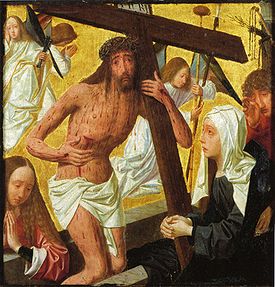LET US JOIN JESUS ON THE ROAD TO CALVARY
(A biblical refection on PALM (PASSION) SUNDAY [YEAR A], 13 April 2014)
Second Reading: Philippians 2:6-11
First Reading: Isaiah 50:4-7; Psalms: Psalm 22:8-9,17-20,23-24; Gospel Reading: Matthew 26:14-27:66 (Matthew 27:11-54)
The Scripture Text
Christ Jesus, who, though He was in the form of God, did not count equality with God a thing to be grasped, but emptied Himself, taking the form of a servant, being born in the likeness of men. And being found in human form He humbled Himself and became obedient unto death, even death on a cross. Therefore God has highly exalted Him and bestowed on Him the name which is above every name, that at the name of Jesus every knee should bow, in heaven and on earth and under the earth, and every tongue confess that Jesus Christ is Lord, to the glory of God the Father. (Philippians 2:6-11 RSV)
Today, and all week, as we recall the events of Jesus’ Passion and death, God is inviting us to do more than simply remember past events. He invites us to join Jesus on the road to Calvary and peer into His heart at each step along the way. As we do this, let us allow Paul’s hymn about the humility of Christ to guide us.
Though He was in the form of God, (Jesus) … emptied Himself (Philippians 2:6-7). What could be a greater self-emptying than for the perfect Son of God to submit to the judgment of sinful men and women? What greater humility could there be than allowing your own creation to put you to death? Imagine Jesus standing before the Sanhedrin and before Pilate, humbly submitting to their judgment and their mockery. He formed each of them and gave them precious gifts they were to use to glorify His Father. And here, these gifts are used instead to beat Him, ridicule Him, and put Him to death.
He was obedient to the point of death, even death on a cross (Philippians 2:8). Imagine the pain of the cross – not just the physical pain, but the emotional and spiritual pain. Jesus was abandoned by everyone. Even heaven seemed closed off. No matter where He looked, there was no comfort to be found, no assurance that the torment of His body was doing anyone any good. Yet He was convinced that God had led Him to the cross, and so He submitted to it, trusting in His Father with every labored breath He took.
Therefore God highly exalted Him and gave Him the name that is above every name (Philippians 2:9). Jesus is glorified because He emptied Himself and accepted death. As you imagine all of heaven bowing before Him, picture the awe on the faces of the angels. They are looking at His now glorified wounds and wondering over the love that moved Him to accept death for our sake. Now fully God and fully man, bearing the marks of the cross, Jesus allowed Himself to be forever changed …… simply because He loves us.
Prayer: Jesus, I am in awe over Your love for me. This week, as I walk with You may I encounter You as never before. By Your Holy Spirit, let me fall in love with You all over again. Amen.


